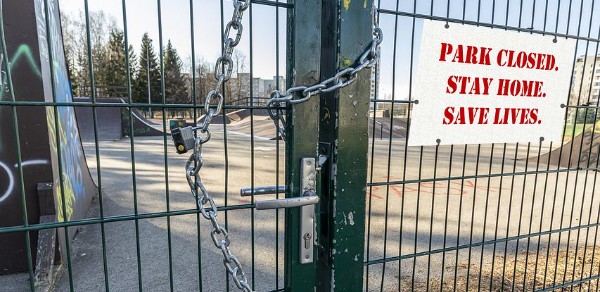
Somehow, the strategy of “two weeks to slow the spread” or “flatten the curve” turned into “zero COVID” among many politicians and health officials around the world.
Australia is one of the last holdouts of that strategy, aiming to totally eliminate the virus. Australians lit up social media over the past year with video of citizens being hauled from their homes by police or handcuffed in parks for violating COVID protocols.
But last week, Prime Minister Scott Morrison made a startling admission.
“This is not a sustainable way to live in this country,” he said.
Jordan Schactel, a policy analyst for the American Institute for Economic Research, writes that the “zero COVID” strategy was initially promoted by the Chinese Communist Party in Wuhan, China.
“In early 2020, Chinese authorities declared the virus that causes COVID-19 had been successfully eliminated from the population through brute force restrictions such as lockdowns, masks, and using the power of a Police State to force people to stay inside their homes for an indefinite period of time,” Schactel said.
Last month, New Zealand, which Schactel describes as the last “zero COVID” holdout, locked down the entire country over one COVID case. The lockdown will remain in effect until at least mid-September.
The Economist reported that since he start of the pandemic, Australia “has used an approach dubbed ‘covid zero,’ stamping on outbreaks down to the last case, whatever it takes.”
From now on, cases will be allowed to rise as long as hospitals can cope with them.
But Australia’s move comes with a caveat: Most restrictions will be dropped once 80% of the adults are vaccinated, which officials believe is achievable by the end of the year.
On Thursday, the premier of the state of New South Wales, Gladys Berejiklian, said the community needs to accept that when the state reopens “unfortunately people will die.”
On Twitter earlier this week, a satirical montage of her many dire pronouncements and strict orders was posted:
Who made this masterpiece!!? pic.twitter.com/chNe2eZTXm
— Caldron Pool (@CaldronPool) September 1, 2021
In a feature in The Atlantic, Conor Friedersdorf asks of Australia, “How long can a democracy maintain emergency restrictions and still call itself a free country?”
Intrastate travel within the country continues to be severely restricted.
Meanwhile, in Australia… pic.twitter.com/sgfxiK89aL
— Rita Panahi (@RitaPanahi) September 2, 2021
And, notably, the government of the state of South Australia is now testing an app “as Orwellian as any in the free world to enforce its quarantine rules.”
Residents of the state will be forced to download an app that combines facial recognition and geolocation.
“The state will text them at random times, and thereafter they will have 15 minutes to take a picture of their face in the location where they are supposed to be,” Friedersdorf writes.
The local police department will be sent to follow up on anyone who fails to report.
“We don’t tell them how often or when, on a random basis they have to reply within 15 minutes,” Premier Steven Marshall explained. “I think every South Australian should feel pretty proud that we are the national pilot for the home-based quarantine app.”
‘Crack down on social media abuse’
Meanwhile, amid a battle over COVID information in the internet, the federal government is considering “a radical plan to crack down on social media abuse,” reported the Australian morning news show “Today.”
People would submit a driver’s license or passport as identification and police would have access to their social media accounts, making them liable for defamation suits or criminal prosectution, the report said.
Authorities say they are hoping to deter people from engaging in bad behavior.
The chairman of a parliamentary inquiry that recommended the move argued there is merit to removing the veil of being anonymous on the internet.
How's that "security over freedom" working out, Australia?pic.twitter.com/l38CGqnFav
— Sydney Watson (@SydneyLWatson) September 2, 2021
In his piece for The Atlantic, Friersdorf writes that prior to 2020, “the idea of Australia all but forbidding its citizens from leaving the country, a restriction associated with Communist regimes, was unthinkable.”
But the country’s borders are currently closed, a government website declares, and international travel from Australia remains strictly controlled to help prevent the spread of COVID-19.”
Friersdorf notes that the rule is enforced despite assurances on another government website that the freedom to leave a country “cannot be made dependent on establishing a purpose or reason for leaving.”
In New South Wales, Police Minister David Elliott has defended the deployment of the Australian military to enforce lockdowns, explaining to the BBC that some residents of the state thought “the rules didn’t apply to them.”
Reuters reported that in Sydney, where more than 5 million people have been in lockdown for more than two months, and Melbourne, the country’s second-biggest city, anti-lockdown protests were banned. Dissenters have gathered anyway, and have been arrested and fined.
“Australia is undoubtedly a democracy, with multiple political parties, regular elections, and the peaceful transfer of power,” Friersdorf writes. “But if a country indefinitely forbids its own citizens from leaving its borders, strands tens of thousands of its citizens abroad, puts strict rules on intrastate travel, prohibits citizens from leaving home without an excuse from an official government list, mandates masks even when people are outdoors and socially distanced, deploys the military to enforce those rules, bans protest, and arrests and fines dissenters, is that country still a liberal democracy?”
Australia, Friersdorf points out, is a neighbor of authoritarian countries as varied as China and Singapore.
“But its own fate, too, may turn on whether its people crave the feeling of safety and security that orders from the top confer, or whether they want to be free.”
Via Wnd
